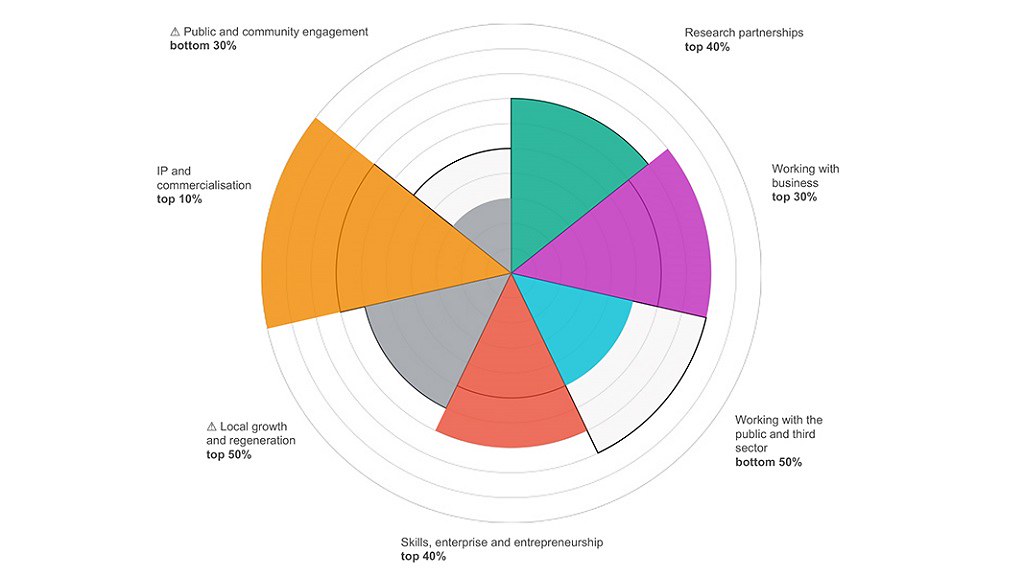The first Knowledge Exchange Framework (KEF) results have been published by Research England, which assess the University’s performance in Knowledge Exchange relative to a group of similar institutions across a range of measures.
The University of Bath scored highly relative to a similar group of Universities for Intellectual Property and Commercialisation, and for Working with Business.
There are seven categories in total. A full breakdown is available.
The KEF is not a league table, but English Universities are clustered into groups according to comparable profiles. The University of Bath is part of ‘Cluster X’; a group of large, high research intensive and broad-discipline universities undertaking a significant amount of excellent research.
In Cluster X much of the research taking place is funded by UKRI and other government bodies; with a discipline portfolio balanced across STEM and non-STEM although with less clinical medicine activity. Cluster X universities also have a large proportion of taught postgraduates in the student population.
Other Cluster X institutions include Brunel, LSE, Loughborough, Royal Holloway, Durham, Hull, Kent, Surrey, York, Birkbeck, Keele, Lancaster, SOAS, UEA, Essex, Exeter, Leicester and Reading.
Professor Jonathan Knight, Pro-Vice-Chancellor (Research), said:
I want to thank and congratulate all those colleagues across the University who have worked hard on our KEF submission and on Knowledge Exchange within the University.
The high scores for our Intellectual Property and Commercialisation in the KEF can be attributed, in part, to the considerable success of spin-out companies at the University of Bath, generating strong revenue and raising significant investments. The increase in IP licencing revenues has also been a contributing factor, reflecting how we support academics to commercialise their research.
The University will use the KEF results to help inform an institutional action plan as part of a new KE Concordat to which it has committed. The Concordat will set out institutional good practice and principles in KE, including around strategy, leadership and transparency.
Simon Bond, SETsquared Innovation Director, said:
The University has a long history of being deeply engaged with industry across a broad area of research strengths, which is at the heart our mission. Furthermore, the inventiveness of our academics has led to increased nurturing of our Intellectual Property and commercialisation. The SETsquared Enterprise Partnership, which includes the University’s SETsquared Bath Innovation Centre, has been voted global #1 three consecutive times for business incubation, also contributing to our strong positioning.
The Framework uses existing data as well as three narrative statements in its assessments. The data is the same that Universities already provide via the annual HESA collection for the Higher Education Business Community Interaction Survey (HE-BCI).
The narrative elements include an institutional statement, and overviews of local growth and regeneration, and public engagement.
The development of a new Knowledge Exchange Framework (KEF) metrics system was announced in October 2017 by the Universities Minister and highlighted in the Government’s Industrial Strategy. It aims to provide more information for the public and businesses on the performance of universities in knowledge exchange (KE) and assesses both qualitative and quantitative evidence, and will now take place as an annual assessment.
The definition for Knowledge Exchange, in the Higher Education Research Act of 2017, is:
in relation to science, technology, humanities or new ideas, means a process or other activity by which knowledge is exchanged where:
a) the knowledge is in, or in connection with, science technology, humanities or new ideas (as the case may be) and...
b) the exchange contributes, or is likely to contribute, (whether directly or indirectly) to an economic or social benefit in the UK or elsewhere.
The University of Bath's submission to the Knowledge Exchange Framework (KEF) is administered by Research and Innovation Services (RIS).


